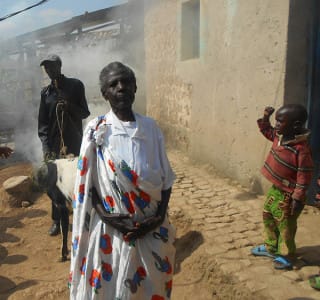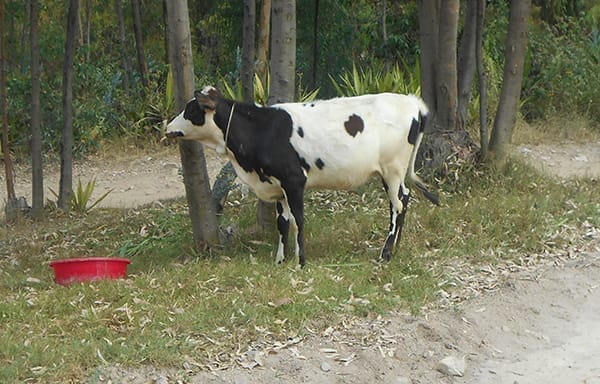Earlier this summer, we and 27 other Wharton MBA students bought a dairy cow. Then we gave that cow to Hakizinka Antoinette, a woman living in extreme poverty in Kabagayi, Rwanda. Perhaps we should explain.
In May, executive and full-time Wharton MBA students participated in a Global Modular Course (GMC) called Conflict, Leadership, and Change: Lessons from Rwanda. The class was led by Katherine Klein, the vice dean for social impact and Edward H. Bowman Professor of Management, and Eric Kacou, WG’04. They were assisted by second-year Lauder student Venkatesh Saha, C’02, ENG’02, and College sophomore and native Rwandan Remy Manzi, who provided invaluable perspective and context as we immersed ourselves within the local culture.
During the course, we had the opportunity to meet with President Paul Kagame, government ministers, local business people and farmers. We learned about the challenges Rwandans faced after the 1994 genocide, and how, more recently, Rwanda has emerged as one of the fastest growing economies in Africa.
We were astounded by the scope of the economic transformation we witnessed. Although Rwanda is landlocked and resource poor—with nearly 45 percent of Rwandans living below the international poverty line (defined by the World Bank as $1.25 per day)—the breadth and pace of change was palpable. Infrastructure is booming, public services have been restored and newly created wealth is shared. More than a million Rwandans have been lifted out of poverty in the past six years alone.

Hakizinka Antoinette
No program better exemplifies this renewal than Rwanda’s “One Cow per Poor Family,” or “Girinka,” program. By providing dairy cows to poor families, Girinka plays a key role in the government’s efforts to alleviate poverty; Rwandans have received more than 145,000 cows since the program launched in 2006. The milk staves off malnutrition, while the sale of surplus milk and crops provides a supplemental income stream, which can then pay for health care and school fees. This success sustains itself, as the recipients are required to gift their first-born female calf to another poor neighbor.
Inspired by what we saw, we wanted to share a gift that expressed our appreciation and aligned with Rwanda’s vision of self-reliance. Girinka seemed the most appropriate way to show our gratitude for all that we had learned. Cattle, economics and social status have been intertwined for generations in Rwanda. Historically, the Belgian colonial authority designated people as Tutsi or Hutu in part based on the ownership of cattle. Moreover, the gifting and exchange of cattle forms a bond between the giver and recipient. The gifting of cattle today signifies, in the words of President Kagame, that the Rwandan people “have chosen to develop [themselves] from within.”
We worked with Manzi and the mayor of Kabgayi to identify a recipient, and they chose Antoinette. She lost her husband during the 1994 genocide and was considered among the poorer members of her community. The cow was officially transferred during a ceremony known as Guca ubwatsi jn—which symbolizes togetherness toward progress. Members of her community promised to support Antoinette in her caretaking of the cow. According to the mayor , Antoinette said she was “happy beyond words” with the generosity of the Wharton community.
Editor’s note: Read Wharton Magazine’s past coverage of the Global Modular Course in Rwanda, in the article “Resolution and Hope in Post-Genocide Rwanda.”

Editor’s note: This blog was co-authored by Kristal Dehnad, who is a student in the Wharton MBA for Executives program. She earned her B.S. at the University of California Davis. Kristal currently works for Stanford University, where she is the director of the Charitable Trust Program. Prior to working at Stanford, Kristal worked in corporate finance at Charles Schwab, Design Within Reach and a B2B startup. She is a CFA and CAIA charter holder.

























